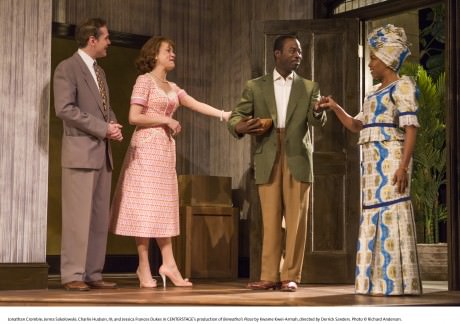As it turns out you still can’t live in a principle. The parallels are drawn here between Bruce Norris’ Pulitzer Prize-Winning play Clybourne Park and CENTERSTAGE’S Artistic Director Kwame Kwei-Armah’s world premier of his new work Beneatha’s Place as CENTERSTAGE presents the second installment in their production of The Raisin Cycle, a rotating repertory of two plays inspired by Lorraine Hansberry’s A Raisin In The Sun. Directed by Derrick Sanders, Beneatha’s Place follows the restlessly intellectual Beneatha out of the iconic Chicago living room and across the world to war torn Nigeria. Echoing the structure of Clybourne Park, the production spends the first act in 1959 and the second some fifty years later, though the connection between the two acts are much stronger here as Beneatha makes the transition herself from one time to another. A poignant and politically charged drama that once again draws our attentions to race as a lens through which the world is viewed, this new work brings The Raisin Cycle full circle.

Scenic Designer Jack Magaw does an incredible job of masking the set of Clybourne Park beneath the house interior of Beneatha’s Place. So regardless of which order you see the productions in, there will be shadows of the previous production helping to augment that connection between the two. Magaw’s interior structure is more simplistic and yet just as realistic as his work for Clybourne Park, the most detailed work done with the many statues and nick-nacks that appear themselves on the set after intermission.
Playwright Kwame Kwei-Armah is a clever, witty playwright with worldly knowledge that he imports into the drama allowing the audience to view it from a global perspective as well as a local standpoint. While his writing is compelling and the play does an outstanding job of continuing to explore the story of Beneatha, it is not without its faults. There are jokes written into the script that toe the fine line of cliché and funny for the sake of being funny without which the script would still have functioned. The second act becomes a fully charged debate that in a sense is endless and choosing the precise moment to end it becomes tricky and Kwei-Armah’s defining moment nearly gets lost in the chaos of the arguments. These things aside, his work is penned with an understanding that allows the audience to quickly jump into the major action without having previously read or seen either Clybourne Park or A Raisin in the Sun.
Kwei-Armah draws the focus of his production around the quote ‘those who own history own the future’ and drives the central objective of debate in the direction of progress. The racial jokes, stereotypes, and debates are all still heavily poised in Kwei-Armah’s pen, but rather than simply viewing them, his work uses the vessel of forward progression and change to further explore these ideas. His framework and discussion that uses the gaming system ‘World of Warcraft’ as a classifying system, regardless if the original analogy came from the internet, is genius because it brings a modern relatable aspect of comparison into the mix, which also adds a healthy dose of humor to the show.
Director Derrick Sanders draws the emotions out of his cast with a force. There is never a dull moment once the arguments get going in the second act. Even in the first act, where Sanders’ focus is more tightly wrapped around the character’s depth, there is always a sense of urgency in their existence. Having seen this cast perform first in Clybourne Park it is astonishing to see the subtle similarities and the stark contrasts they are able to bring to these characters under Sanders’ guidance.
New to The Raisin Cycle and only featured in the first act of the show is Aunty Fola (Kim James Bey). Aunt Fola’s arrival on the scene marks the beginning of the cultural differences between a native Nigerian woman and the transplanted woman that is Beneatha. With a well practiced accent, Aunty Fola is the epitome of the meddlesome relative stereotype; showing up unannounced and uninvited to stir up just a little bit of trouble. Bey portrays Aunty Fola with a snappish air and a pistol of an attitude when it comes to holding her ground against her slightly stubborn nephew. Despite her comic edge she is filled with wisdom, and is vocally grounded when she presents her beliefs to Beneatha; a fully-formed character that kicks the action into gear in the first act.
Being the doting, albeit racially ignorant, Alabaman missionary type Christian folk, Peter (Jonathan Crombie) and Joan Nelson (Jenna Sokolowski) just scream back-handed southern charm. They mean well in an unintentional condescending fashion with their perky personalities and slightly more learned tongues. Sokolowski masters her southern drawl and brings a good deal of that saccharine southern charm right into her bubbly personality, bouncing about with an eager do-gooder approach to showing off the home and all its amenities to Beneatha.
Crombie, whose best work comes in the form of Gary Jacobs in Act II, is a versatile man that the audience quickly associates with villainy because of the argumentative side he takes against Beneatha in Act II. Jacobs riles against Mark a fair bit, much to Beneatha’s amusement during this debate over whether or not the study of ‘white privilege’ should progressively replace African-American studies at their college. His anger is channeled vocally as he quickly becomes the laughing stock of their jokes, and the more they laugh the angrier his character gets until he lashes out viciously at Beneatha and turns the tables on her bringing up the notion that ‘black privilege’ exists as well.
Playing first the iconic leader Joseph Asagai and later the underling junior staff Wale Oguns, Charlie Hudson III is more than just a notable presence on the stage. His Nigerian accent for the Joseph character is prominent and really draws you into his reality in the first act. He has a rocky relationship with young Beneatha as his wife and is vocally expressive with emotional vehemence in those final moments before the first act ends. As Wale, Hudson is a much more subdued character though not without being firmly grounded in his beliefs, facing off with Beneatha just the same, though in a much subtler manner.
The real driving moments of this production are the relationships cultivated between Beneatha (Jessica Frances Dukes) and Daniel Barnes/Mark Bond (played in the first and second act respectively by James Ludwig). In 1959, Daniel Barnes is introduced as a slightly flirty fun and saucy character who only displays hints of these characteristics through his witty banter with Beneatha, and at first they really do bristle and spark with one another. But they share a common bond and the scene with the minstrel mask and the dancing explores that on a deeply thematic level. Later as Mark Bond, Ludwig fiercely sticks to his vision against Beneatha, the pair tempestuously arguing their point with tempers flaring at full capacity until they literally blow each other out of the water with what comes out of their mouths.
Jessica Frances Dukes is the most versatile performer on the stage. First presenting herself as young Beneatha with an eager bright approach to the world; to see the transformation she then makes to aged Beneatha is astonishing. The physicality that Dukes embodies to show how she has traveled through the years is remarkable and completely authentic from her slightly crippled posture to the way she moves about the space. And while her physical expressions may change – her emotional turmoil remains the same, those loud explosive moments of true passion roaring through her voice regardless of her age. She gives a stellar performance in both acts and carries the show with her wicked sense of humor, her daring sense of accomplishment, and her overall sense of pride in who the character really is.
The Raisin Cycle may be viewed in any order and a previous knowledge of A Raisin in the Sun is not required, though it brings a level of deeply poignant reasoning to both productions.

Running Time: Approximately Two hours, with one intermission.
Beneatha’s Place plays through June 16, 2013 in rotating repertory with Clybourne Park as a part of The Raisin Cycle at CENTERSTAGE — 700 North Calvert Street, in Baltimore, MD. For tickets, call the box office at (410) 332-0033, or purchase them online.




